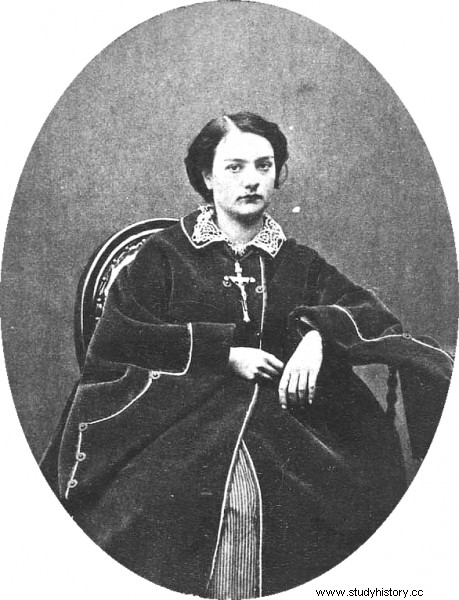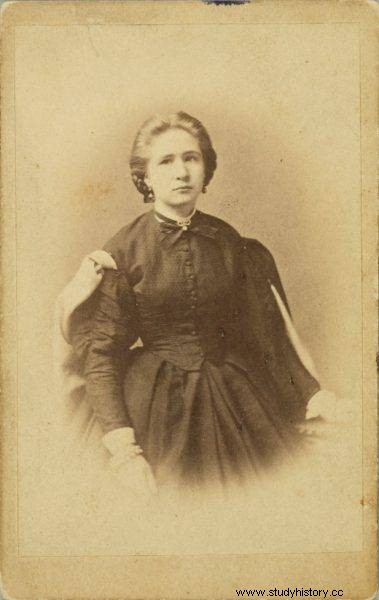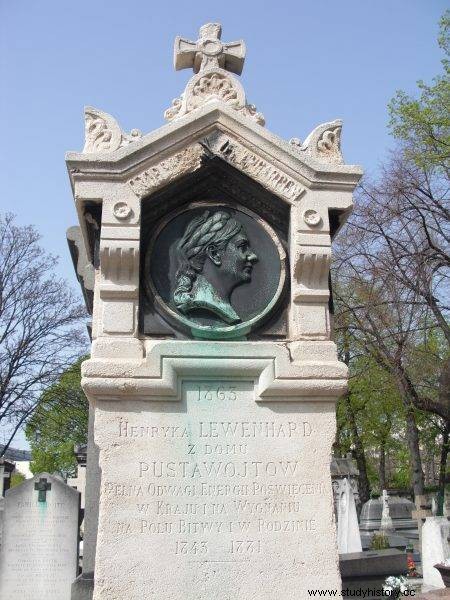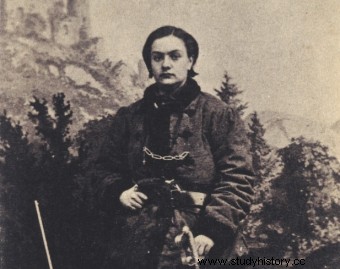When the January Uprising broke out, this young girl didn't just want to look at him idly. She wanted to fight as much as men. She put on a men's uniform and assumed a new identity. She was known in the insurgent ranks as Michał Smok. Who was Henryka Pustowójtówna?
Henryka Pustowójtówna was the daughter of a Pole and a Russian. Although her older brother was a Russian officer and suppressed the uprising in 1863–1864, she herself took the Polish side in the January Uprising. An interesting fact is that due to Henryka's mixed origin, the Russians considered her Russian, not Polish - Aleksander Herzen wrote about her that she was "a Russian woman in the ranks of Langiewicz."
Polish-Russian love story
Henryka's parents were General Trofim Pustowojtow and Polish noblewoman Marianna Kossakowska. The couple met in February 1835 at a ball at the Resursa Obywatelska. The beautiful Polish woman immediately caught the eye of a Russian officer who kept inviting her to dance.
Marianna reciprocated Trofim's sympathy - much to the displeasure of her mother, Brygida Kossakowska née Rzewuski. No wonder, after all, less than 4 years have passed since the suppression of the November Uprising. But the daughter did not want to listen to her mother's arguments and in July 1835 she married a Russian . Marianna brought a dowry in the amount of PLN 35,000. rubles, the young husband owned two estates near Zhytomyr.

When the January Uprising broke out, this young girl didn't just want to look at him idly. She wanted to fight equally with men.
First, the couple had a son, Alexander, and then a daughter, Julia. Finally, in 1838, Henryka was born in Wierzchowice (the property of her Polish grandmother near Lublin), who was named Anna Henryka during her baptism. Mother called her in the Russian fashion - Aniutka or Aniuta, grandmother - Henryczka.
Dionizja Wawrzykowska-Wierciochowa, a biographer of Pustowójtówna, claims that her grandmother secretly baptized the girl in Catholic order . It seems unlikely, however, because in 1836 a new Marriage Act was introduced . According to it, children born from mixed marriages, in which one of the partners was Orthodox, were baptized in the church. And since Trofim Pustovoytov was a Russian officer, he could not break the law because he was punishable by imprisonment.
How Henry was tempered
It can be presumed that the eldest Alexander was greatly influenced by his father and quickly adopted the Russian point of view. General Pustovoytov was rarely absorbed in his duties at home. Anyway the love of Henryka's parents did not survive, so the sisters spent more time with Marianna's grandmother, which instilled in them patriotic values.
In 1848, Henryka and her sister Julia began studying at the Institute for Noble Maidens in Puławy. Although it was a Russian facility, as historian Nikołaj Berg writes, "out of three hundred Polish women, there were only 50 pupils of Russian origin in Puławy, and they mostly spoke Polish better than Russian . Lectures were held in Polish or French, but only 1 hour a week was allocated to Russian. " Among the 13 class ladies there was only 1 Russian.
At school, Henryka made friends with Ludwika Sierzputowska, the daughter of a Polish general in the Russian service. Her friend introduced her to a peculiar conspiracy in the facility - girls, incl. secretly prayed in Polish.

In 1861, Henryka went to Lublin to take part in a mourning demonstration in honor of the fallen in Warsaw together with her friends from the local Institute for Noble Maidens.
After graduating, Pustowójtówna left for Żytomierz, where her mother ran an open house. Poles and Russians used to visit it. One of the guests was Jarosław Dąbrowski - an officer of the tsarist army, who managed to become famous for his heroic deeds during the fighting in the Caucasus.
In 1861, Henryka went to Lublin to take part in a mourning demonstration in honor of the fallen in Warsaw together with her friends from the Institute for Noble Maidens. She stayed in the city for several months and organized patriotic events.
The authorities quickly noticed her activities. She was punished by sending her to a monastery in the heart of Russia - it was supposed to be a way to "calm down" the girl. But Pustowójtówna escaped from there and found herself in the territory of today's Moldova, from where, after the outbreak of the January Uprising, she escaped to the Kingdom of Poland.
Michał Smok
In February 1863, Henryka found herself in Staszów, in Marian Langiewicz's branch. Even then, she was wearing men's clothes and introduced herself as Michał Smok. During the first march, an old soldier talked to her, who noticed the lack of facial hair on the young man's face:" My friend probably hardly obtained permission from my mother to join the army? Haven't we been mutated yet? ". The Hollowhead replied, "Where is it ?!" Not only mother, but also grandmother gave their blessing. My voice is natural because I am a woman. ”
The sight of a woman in the ranks of the insurgents was remembered by many participants of those events. One of them mentioned that during the parade "Private Michał Smok marched on the right wing in the right line." Soon Langiewicz appointed Henryka the adjutant of General Czachowski, who was an impetuous man and often beat the Pustowójtówna with a whip.
Michał Smok became an integral part of her personality for Henryka. One day she met a friend who was supposed to go to Lublin, where her mother was staying at that time. She asked him to tell Marianna that "Michał Smok is fine".

Pustowójtówna died suddenly, at the age of 43, most likely as a result of a heart attack. She was buried in the Montparnasse Cemetery.
Henryka was a great shooter, and during the skirmishes with the Russians she showed remarkable courage. As she recalled years later, during the January Uprising the worst were all-night marches, sleeping on straw in other people's barns and napping in a half-sitting position. Often, insurgents had to spend many days in the open, regardless of snow and rain. Over time, Langiewicz transferred Pustowójtówna to his staff.
The news of a woman in male disguise fighting in the January Uprising spread throughout Europe. The opposition writer Aleksander Herzen, who lived in exile, was delighted with it. He wrote about her in the Kolokoł magazine he published:“Hello and glory to her! Best regards to her! ”.
Emigration
After the defeat of the uprising, Henryk emigrated. First she lived in Prague, then moved to Vienna. She found a job making ties. She also helped insurgents who found themselves in a difficult situation. It aroused interest among Polish emigrants, most of whom were young people. The heroine of the uprising aroused not necessarily patriotic feelings in them. They wanted to adore her, but she wouldn't let them.
After some time, Pustowójtówna moved to Paris. During the Franco-Prussian war, she was a nurse. She was awarded the French Cross of Merit for her combat achievements. She also fought on the barricades of the Paris Commune. Jarosław Dąbrowski, one of the leaders of the uprising, died in her hands. 
In 1873, Henryka married Stanisław Loewenhard, a doctor from Langiewicz's department. The couple had four children. Pustowójtówna died suddenly, at the age of 43, most likely as a result of a heart attack. She was buried in the Montparnasse Cemetery.
